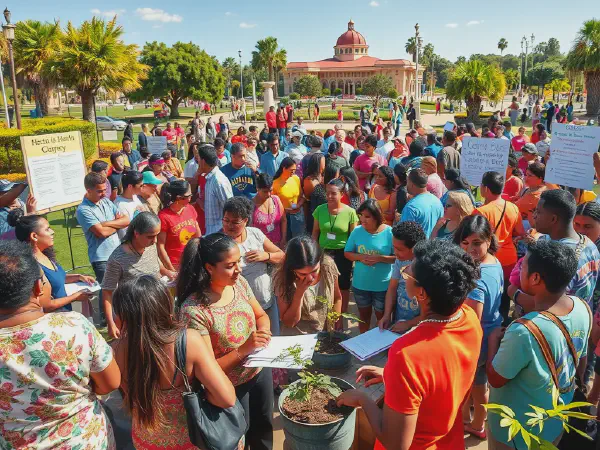Empowering Change: Chula Vista Community Advocate Guide

Understanding the Role of the Chula Vista Community Advocate
The Chula Vista Community Advocate plays a vital role in bridging the gap between the local government and the residents of Chula Vista, California. This position serves as a conduit for communication, ensuring that the voices of the community are heard and addressed in the decision-making processes. By advocating for various community needs and concerns, the Chula Vista Community Advocate fosters an inclusive environment where every resident can have a say in shaping the future of their community.
Community advocates in Chula Vista are instrumental in representing underprivileged groups and individuals whose needs might otherwise be overlooked. They work tirelessly to ensure that issues such as education, healthcare, housing, and social services are prioritized by local policymakers. The Chula Vista Community Advocate also raises awareness about community resources and services available to residents, making it easier for them to access the support they need.
Additionally, the Chula Vista Community Advocate plays a significant role in mobilizing citizens to engage in local governance. By organizing community meetings, workshops, and outreach initiatives, advocates empower residents to voice their opinions and participate in discussions about local policies and initiatives. This active engagement helps build a stronger community where residents feel valued and included in the decision-making process.
The impact of a Chula Vista Community Advocate extends beyond mere representation; they also serve as educators, guiding residents on their rights and how to effectively advocate for their needs. By providing information about community resources and legal rights, the advocate promotes self-advocacy among residents, equipping them with the necessary tools to express their concerns confidently and constructively.
Through collaboration with various stakeholders, including local government agencies, nonprofit organizations, and community groups, the Chula Vista Community Advocate strives to create a more equitable and supportive environment for all residents. This multilateral approach not only enhances the effectiveness of advocacy efforts but also fosters a spirit of unity and cooperation within the community.
Role of Community Advocates
The responsibilities of a Chula Vista community advocate encompass a wide range of activities aimed at supporting and uplifting the community. These responsibilities include outreach and engagement, which involve reaching out to different segments of the community to understand their needs and concerns better. Advocates conduct surveys, hold forums, and initiate one-on-one conversations to gather insights that are crucial for informed advocacy.
Moreover, community advocates have a significant impact on local policies and initiatives by representing community interests at public meetings, hearings, and forums. They analyze proposed legislation and policy changes, providing feedback and recommendations that reflect the community's perspective. Their advocacy work often leads to the development of programs and initiatives that directly address the unique challenges faced by Chula Vista residents.
The role of a Chula Vista community advocate is essential for promoting affordable housing solutions in the region.
Building relationships and trust within the community is another core aspect of a community advocate's role. By engaging with residents and fostering open lines of communication, Chula Vista community advocates nurture an environment where individuals feel comfortable sharing their concerns and experiences. This trust is essential for gathering accurate information about community needs and for facilitating collaboration between residents and local authorities.
Advocacy Strategies
Effective communication techniques are fundamental for successful advocacy work. Community advocates in Chula Vista utilize a variety of communication strategies to ensure that messages are clear and resonate with the audience. This includes developing compelling narratives about community issues, using social media to amplify voices, and leveraging visual aids to present data in an accessible manner.
Engaging with local government is crucial for advocates. They build relationships with elected officials and city staff to create an ongoing dialogue about community needs and priorities. Throughout various platforms, such as town hall meetings and committee sessions, advocates can articulate residents' concerns and hold local government accountable for addressing these issues.
Mobilizing community support and resources is another strategy employed by community advocates. By organizing community events, volunteer drives, and other initiatives, advocates harness the collective power of residents to effect change. This mobilization not only raises awareness about specific issues but also demonstrates the community's commitment to improvement and solidarity in the face of challenges.
Community Issues Addressed
Education and youth programs are among the pressing issues that Chula Vista community advocates address. They advocate for increased funding for local schools, after-school programs, and opportunities for youth engagement. By connecting families with educational resources, advocates help to ensure that children in Chula Vista have access to the support they need to succeed academically and socially.
Affordable housing advocacy is another critical area of focus. With the rising cost of living in California, community advocates work to promote policies that support affordable housing developments and tenant protections. They collaborate with housing organizations and policymakers to create sustainable solutions that address homelessness and housing insecurity in Chula Vista.
Environmental concerns also feature prominently in the advocacy efforts within Chula Vista. Advocates work on issues such as pollution, sustainability, and access to green spaces. By raising awareness and promoting environmental initiatives, community advocates strive to create a cleaner, healthier community for all residents to enjoy.
Success Stories
There have been numerous success stories stemming from advocacy efforts in Chula Vista. For example, community advocates played an instrumental role in the establishment of new parks and recreation facilities, resulting in improved public spaces for residents. Advocacy efforts have also led to increased funding for educational programs, leading to greater academic success for local students.
Profiles of impactful community advocates reveal the dedication and passion that drives advocacy work in Chula Vista. Many advocates come from diverse backgrounds and bring with them a wealth of experience and insights. Their stories inspire others in the community to get involved and take action toward creating positive change.
From advocacy experiences, valuable lessons have been learned about the importance of persistence, collaboration, and community engagement. Successful advocates reflect on how grassroots movements can lead to significant policy changes and emphasize the importance of listening to community voices to inform effective advocacy strategies.
Getting Involved
For those interested in becoming a community advocate in Chula Vista, there are several ways to start. Engaging with local nonprofit organizations, attending community meetings, and volunteering for advocacy initiatives are excellent first steps. Building relationships with seasoned advocates can also provide valuable mentorship and guidance.
Volunteering opportunities abound in Chula Vista, where community members can lend their support to advocacy efforts. From participating in local events to assisting with outreach and engagement activities, individuals can play a role in fostering community connections and addressing key issues.
Training programs for advocates are available through various organizations, providing individuals with skills and knowledge to effectively advocate for their community. These programs cover topics such as communication strategies, local governance, and grassroots organizing, equipping aspiring advocates with essential tools for success.
